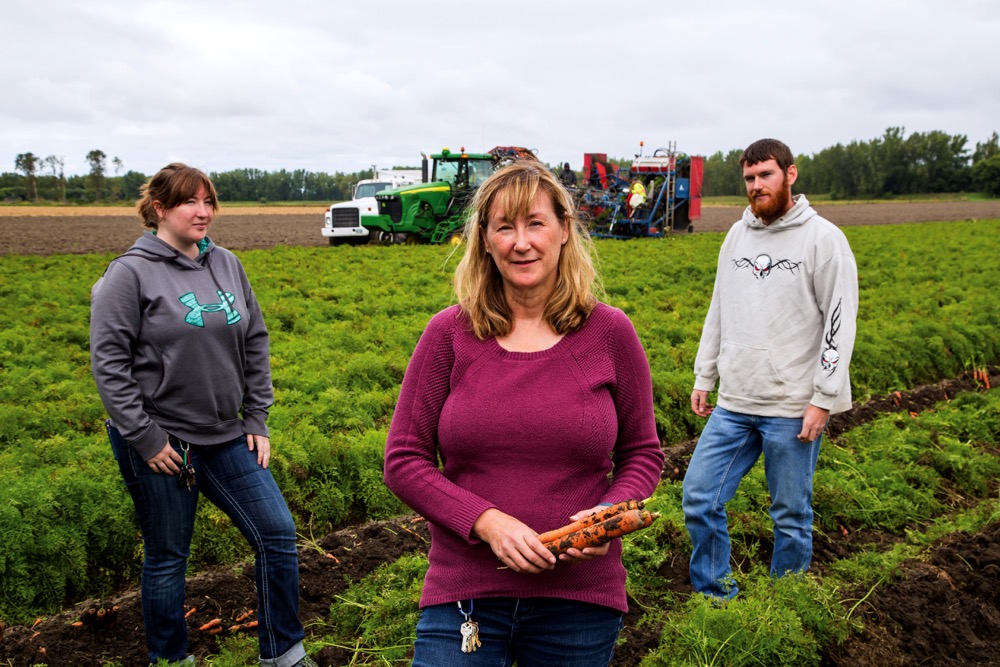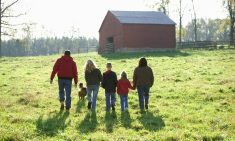The Connery family thought that it was probably more prepared than most farm families for succession, and in many ways it was. But no one anticipated the sudden death of its two principal farming partners, or that the farm business would transfer to a daughter-in-law.
When brothers, Doug and Jeff Connery died within six months of each other in December 2011 and June 2012, it was Jeff’s wife, Beth and their two children, Samantha (27) and Chris (25), who took the reins of the operation.
Unusual arrangement
“It’s an unusual arrangement because I am the daughter-in-law running the farm now rather than a child,” says Beth. “I enjoy the farm and the work, and producing food that goes straight from our field to people’s tables. But it’s a way for the farm to continue through the family.”
Read Also

Sibling squeeze part 6: The emotional stakes of a family legacy
The final instalment in a six-part series exploring the challenges of sibling conflict and the effect it can have on…
Doug’s family wasn’t interested in continuing to farm, so that meant Beth and her kids had to make a fast decision. But it was a definite — and united — choice.
“I asked the kids if they wanted to farm and they said yes. So I said, then we’ll farm,” says Beth. “I had two good managers, and the next day I said there’s a crop out in the field and we have to take care of it.”
Ed and Bev Connery moved Connery Riverdale Farms from its location near the Red River south of Winnipeg to Portage la Prairie in the early 1960s, where the area offered land, water and a microclimate better suited to growing vegetables.
Ed was an innovator, always ready to try new varieties and new technologies, and he had been instrumental in establishing the vegetable marketing co-operative, Peak of the Market. Today the farm covers about 1,000 acres, 650 of which produce asparagus, strawberries, broccoli, carrots and cooking onions, while the rest is in wheat as a rotation crop.
A road map in place
Following the decision by Ed (Jeff and Doug’s father) to go into politics in 1986, all members of the Connery family put wills and powers of attorney in place, and they had agreed upon a succession plan in 1986. Some 25 years later, that succession planning was to help them when tragedy struck.
“We were fortunate because we did have some plans in place. There was a buy-sell agreement and everybody knew what it said and we all signed off on it a long time ago,” says Beth. “The documents were almost 30 years old, and they were by no means perfect, but they certainly provided a road map and a way that we could move forward.”
The experience taught her, however, that planning documents, and especially wills, should reflect current realities. “If you’ve got children or if something’s changing in your life and you’re getting married or whatever it is, it’s important to get your will updated,” says Beth. “Review it at least every five years. Pull it out and read it.”
Lots to learn
Beth had worked on the farm for 25 years in the office handling the administration, payroll, bookkeeping and human resources, so she had a good handle on the financial situation of the farm and also knew a little about the warehousing side of things. “Jeff was doing all the field stuff so I had a good idea of the rhythm of the farm, although I didn’t know the details of everything,” she says.
One of the hardest things to deal with was the agronomy side of the business, admits Beth. “Getting back into the agronomics was difficult and even now I’m still learning,” she says. “But I think it’s a constant learning process because there’s always something new to learn about fertilizers and seed, and the way we’re treating things, and new irrigation systems. I had to get back into that mindset and look at those things again in a way I hadn’t in a very long time.”
Beth, who had grown up on a mixed farm in the area was able to turn to her neighbours and family for advice, which was a huge help. “I’m blessed with a very large and extended family and friends, so if I needed something I could ask,” she says. “There were a lot of people willing to help and the other growers in the area were very generous when we had questions. Grandpa Ed and his wife, Bev, although they are retired, have also been really supportive and helpful. For me, just knowing that there’s someone there I can ask questions of makes it doable.”
Loss of knowledge
A vegetable operation requires lots of people, which meant there were managers in place who took care of most of the immediate day-to-day things. But as time went by everyone realized that the farm had lost a huge amount of knowledge.
The family puts more down on paper now, Beth says, but she admits this does take discipline.
Time to grieve
Beth made certain that she found the time to grieve, and says this was one of the most important things she needed to do to help her carry on. “You have to allow yourself to grieve because if you don’t, it will come back and bite you when you least expect it. I quite deliberately made sure I took time for myself,” she says. “My family and the farm bunch were very generous in allowing me to disappear whenever I needed to.”
She had to resist the temptation to throw herself into the running of the farm and overwork herself and others. “Our harvest period is six months long. We need a start of the day and an end of the day because we know we’re going to be doing it for months,” she says. “I had to learn to pace myself as well.”
Talk lots and early
Families need to make sure they have discussions about the future of the farm, and what everyone wants, and that they get plans in place as early as possible, because when a tragedy strikes, people are at their most vulnerable and it’s really tough to have to make decisions, says Beth. “It was very stressful… you’ll hear advice not to make any major decisions in your life for a year after a death like that, and I was making big ones within days. There was no way to avoid that, but if you’ve already discussed it ahead of time, and if you’ve thought it out, and have the plans in place, then the urgency isn’t there.”
The Connerys’ next step is to work on the next succession plan, says Beth. “Now we need to figure out how we’re going to devolve this to the next generation, and how we’re going to put options in for grandchildren.”
Look for the joy
As the family prepares for future milestones, the memory of lost loved ones is still with them, but Beth’s final advice is that it’s important to look for the joy.
“It’s there even when things seem to be falling apart and darkest,” Beth says. “It’s there in the memories of the laughter shared and stories told and in the creation of new memories with friends and family… Our loved ones would have wanted us to live and share our lives, not mark time.”
10 tips to help prepare for an unexpected farm death
Losing a principal farm partner can cause all sorts of very real and very practical issues and challenges for those left behind.
Beth Connery found herself in the position of running the family farm three years ago when her husband, Jeff and his brother, Doug, who farmed together, died within six months of each other.
Going through that experience has taught her and her two children Samantha and Chris how to prepare for an unexpected farm succession. She shares their learnings below:
Write everything down
Record everything that happens on the farm, whether it’s on an ongoing basis or at a minimum once a year going through the crops that you’ve grown, which varieties you tried, and what equipment you used. If you tried something new, did it work or not, and why? What was the weather like this season, and anything else that happened over the year. Information that only exists in your head isn’t much use to anyone else.
Rely on others
Rely on the people within your operation who know what they’re doing, and don’t be afraid to ask for help from family, other producers or neighbours. Ask questions if you don’t know something because someone is always willing to share their experience with you.
Have a current will
Make sure that everyone has a will and review it at least every five years to make sure it still reflects your situation and what you want to happen. Update your will whenever something changes in your life or there is a major event. Make sure that you have powers of attorney and living wills in place. Even if you don’t have a full succession plan, at least your will provides a road map for your partner to follow.
Have a succession plan
Have some kind of succession plan in place, and make sure that wills are on side with the plan. Talk to your lawyer or your accountant or other advisers for advice and a path to follow. If there is a buy-sell agreement, make sure everyone agrees to it. Anticipate any issues ahead of time and have a plan carefully laid out so you just have to follow the steps. Your goal is to create certainty for those left behind and to help avoid possible conflicts or questions.
Talk
You have to do a lot of talking because a succession plan does not come together over three meetings. It requires a lot of discussion about how things will work.
Discuss burial
It’s not a macabre topic — and it makes it a lot easier for your loved ones to make the necessary arrangements if they know in advance what your wishes are. So make sure you talk about what you want to happen.
Make a list
Make a list of important things such as life insurance policies, RRSPs, TFSAs, bank accounts, or other investments. Include policy numbers, contacts, and their phone number and email. Does the family know your passwords?
Know the finances
Have a working knowledge of the farm’s financial situation and bookkeeping system. Even if you’re not paying the bills and doing the bookkeeping on an ongoing basis, know which bank you deal with, who your lawyer is, who the accountant is, and how to pay the bills.
Make sure you can access the money
Talk with the bank about bank accounts. If they aren’t joint accounts, and you don’t want them to be, make arrangements with the bank so that you can access them, or you may not be able to pay your bills.
Allow Time for Yourself
Losing a loved one is stressful. You will need quiet time for yourself. Allow yourself to grieve. You will not have the patience that you normally do, so you need to be kind to yourself and the other people around you. It’s only by coming together that you can find the best path forward.
















